How to Grow Peonies
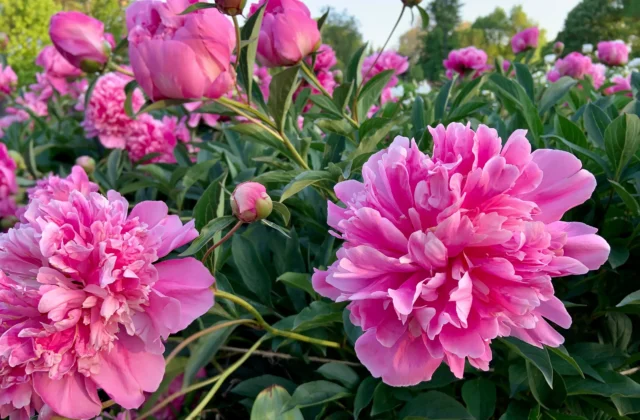
Introduction
Peonies, belong to the genus Paeonia. Gardeners and flower enthusiasts love their luxurious blooms and intoxicating fragrance. Understanding the basics of how to grow peonies is essential for any aspiring gardener. Peonies have been an important part of many cultures for centuries. In Chinese tradition, they symbolize prosperity and honor. In Europe, they were loved by nobility and aristocracy. Growing peonies starts with selecting the right plant.
Understanding how to grow peonies begins with selecting the ideal planting location. These resilient perennials thrive in well-draining soil and prefer a sunny spot. Once planted, mastering how to grow peonies involves providing consistent care and attention throughout the growing season. Consider space when choosing peony varieties for your garden.
Selecting the Perfect Peony Varieties
For eye-catching garden beds, mix peonies in pink, white, yellow, and red hues. It’s also important to familiarize yourself with different peony varieties with unique characteristics and specific growing conditions. How to grow peonies begins with selecting a suitable planting location. Understanding flower form variations like single, semi-double, double, anemone-centered, and Japanese will guide you in creating a beautiful peony paradise.
Understanding Peony Varieties
When embarking on your peony paradise journey, it’s crucial to familiarize yourself with the diverse types of peonies available. Whether it’s the herbaceous, tree, or intersectional hybrids, each variety boasts unique characteristics and requires specific growing conditions. Understanding flower form variations like single, semi-double, double, anemone-centered, and Japanese guides garden design. Appreciating diverse foliage textures, colors, and fragrances enhances peony paradise. Understanding how to grow peonies involves choosing the right peony variety for your climate.
Varieties of Peonies
Before we delve into how to grow peonies it is essential to learn about its varieties. Peonies come in many types, each with a unique charm. From herbaceous to tree and intersectional hybrids, knowing the different types can expand the horizons for flower enthusiasts.
Herbaceous Peonies
These are the most common and widely cultivated peonies, known for their lush foliage and showy flowers. Herbaceous peonies go dormant in winter, resurfacing in spring with varied colorful blooms. With proper care and maintenance, herbaceous peonies can thrive for decades, rewarding gardeners with abundant blooms each spring.
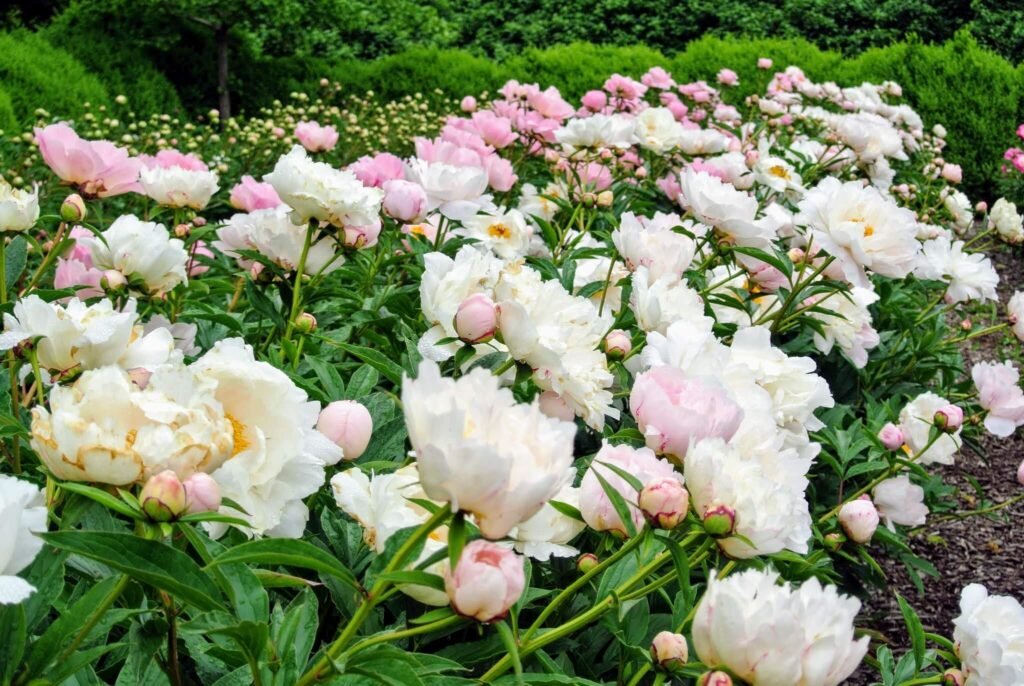
They are categorized into several types based on flower form and growth habits. Here are the main types of herbaceous peonies:
Single-flowered Herbaceous Peonies
These peonies feature a single row of petals surrounding a prominent center of stamens. Single-flowered varieties often have a simple yet elegant appearance, with petals that may be flat or slightly cupped. Examples include ‘Sarah Bernhardt’, and ‘Early Scout’.
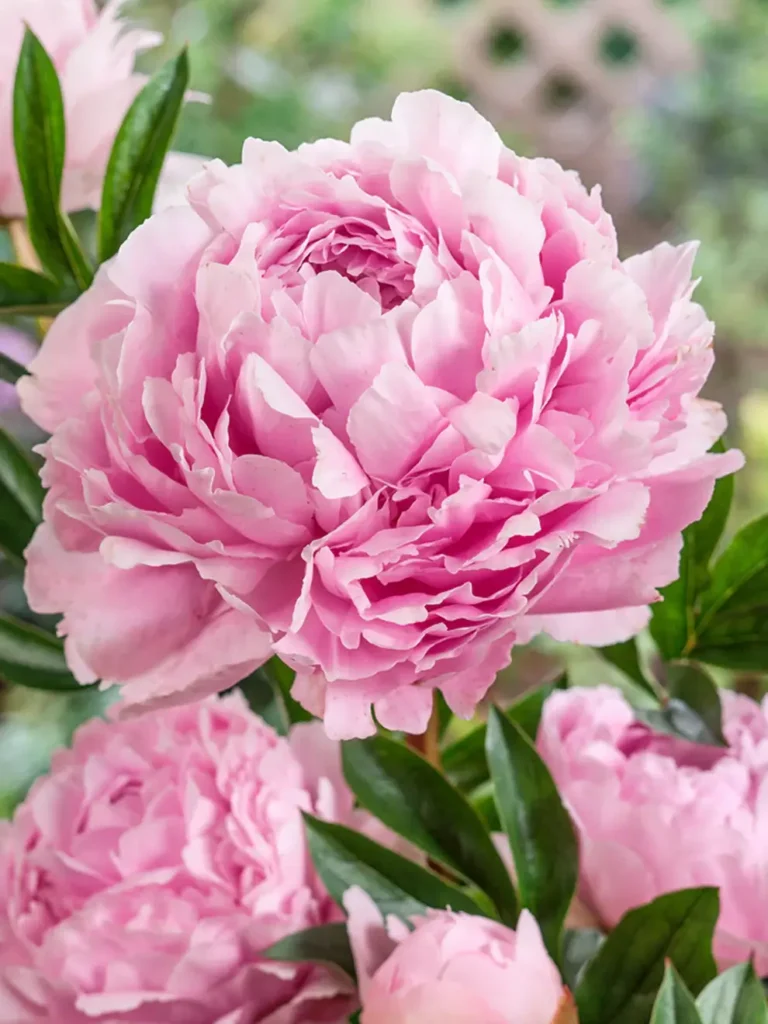
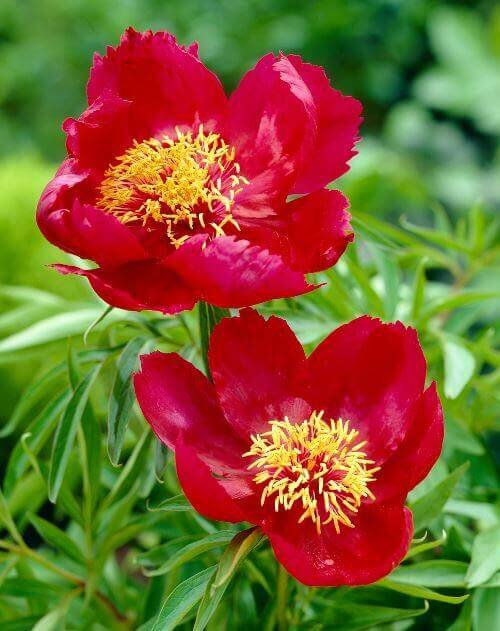
Double-Flowered Herbaceous Peonies
They are prized for their densely packed petals, creating a lush, voluminous bloom. These peonies may have multiple layers of petals, giving them a luxurious and opulent appearance. Varieties such as ‘Bowl of Beauty’, ‘Festiva Maxima’, and ‘Duchesse de Nemours’ are popular examples of double-flowered herbaceous peonies.
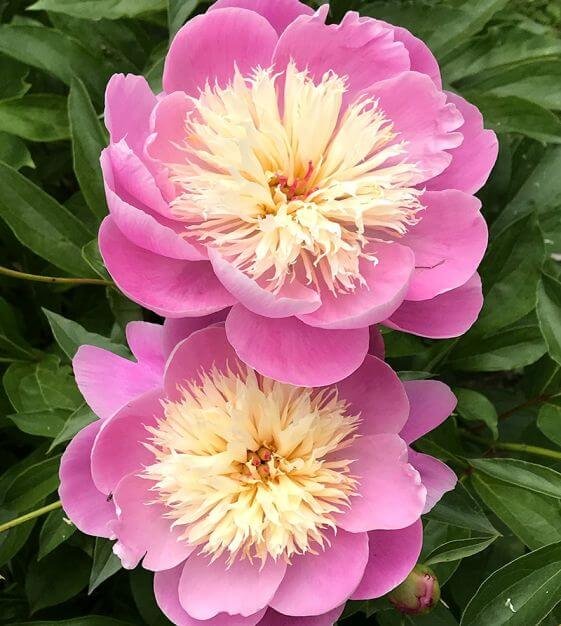
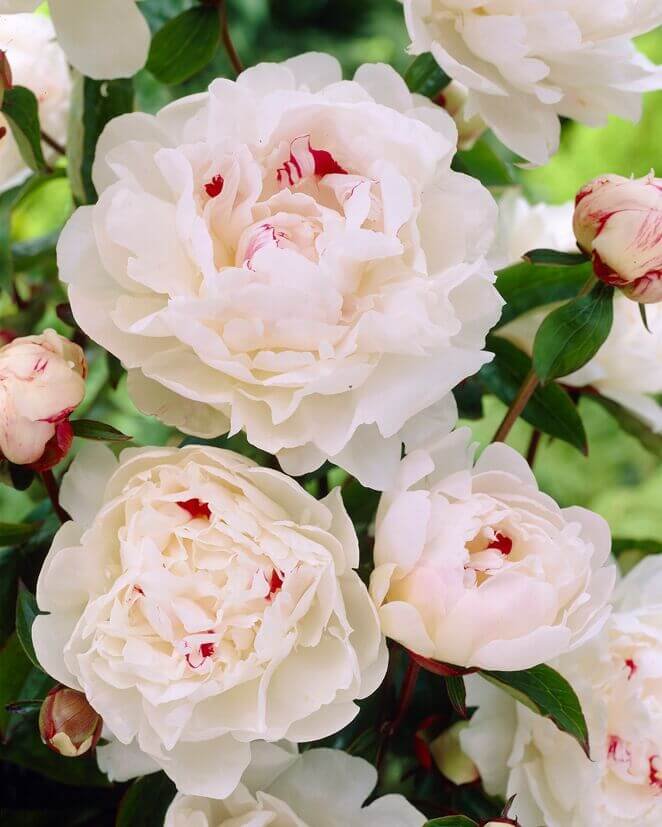
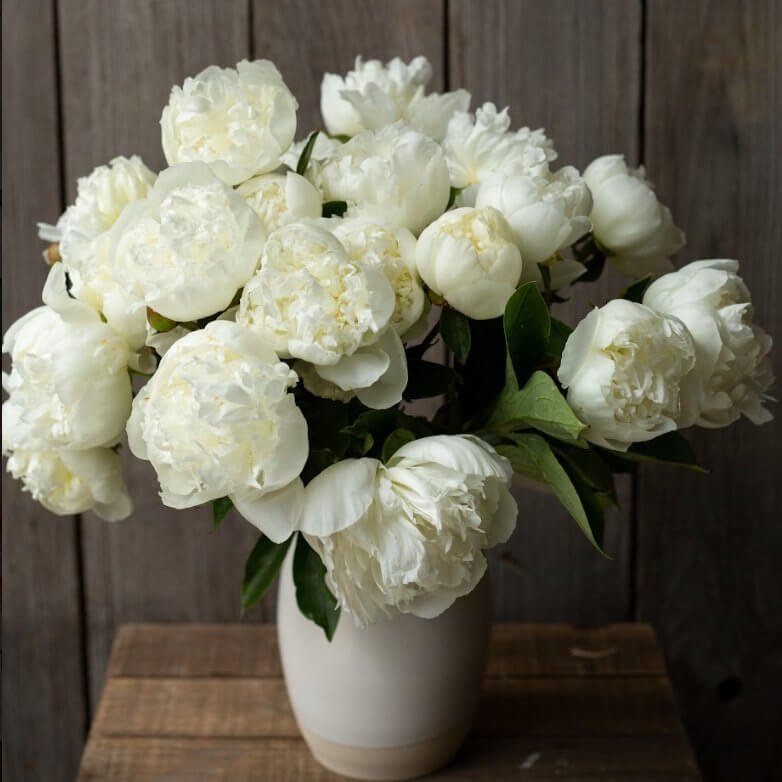
Semi-double Flowered Herbaceous Peonies
Semi-double herbaceous peonies strike a balance between single and double-flowered varieties, featuring a combination of petals and stamens. These peonies offer a more intricate bloom form than singles but are not as densely packed as doubles. Varieties like ‘Coral Sunset’ and ‘Kansas’ showcase the beauty of semi-double flowered herbaceous peonies.

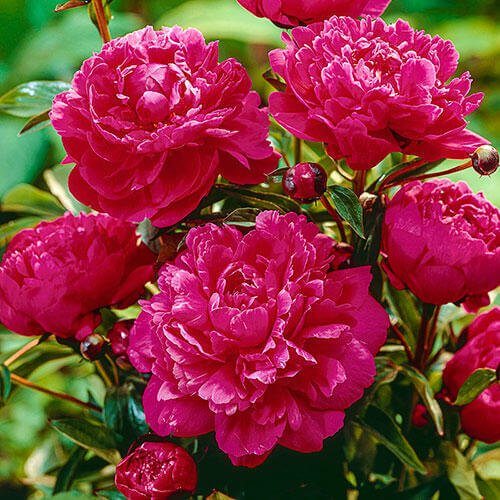
Anemone Flowered Herbaceous Peonies
Anemone peonies have petaloid stamens in the center and outer petals around them. These peonies have a distinctive appearance reminiscent of anemone flowers, with a central boss of contrasting stamens. Varieties such as ‘Do Tell’, ‘Gay Paree’, and ‘Cora Stubbs’ exhibit the unique charm of anemone-flowered herbaceous peonies.
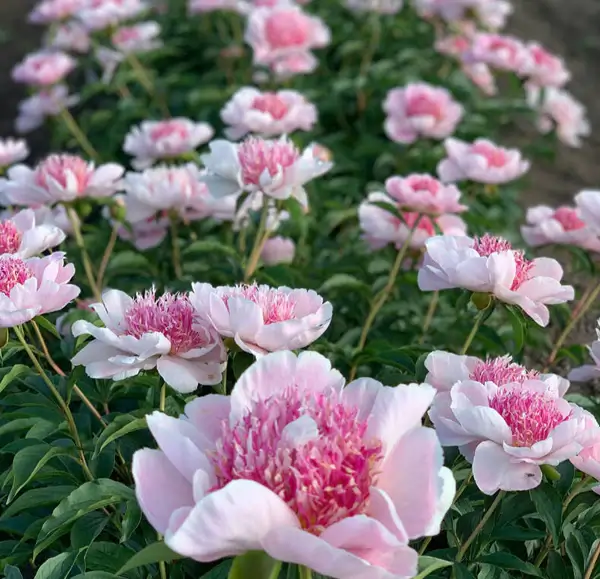
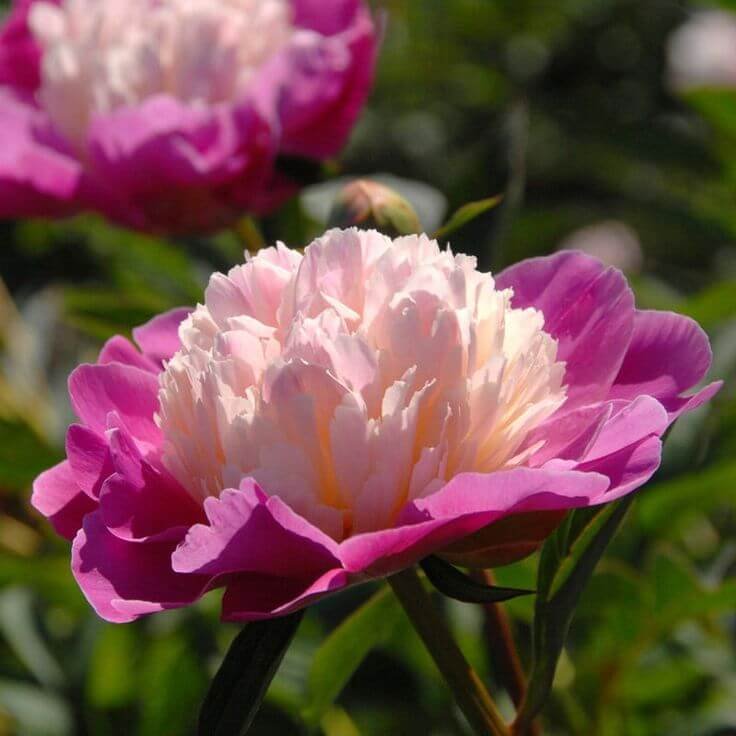
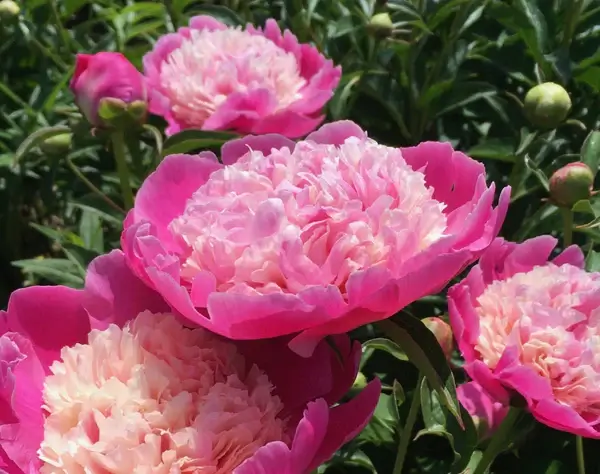
Japanese Flowered Herbaceous Peonies
Japanese-flowered herbaceous peonies feature a center of petaloid stamens surrounded by one or more rows of broad, flat petals. The central stamens may be of a contrasting color, creating a striking contrast with the surrounding petals. Varieties like ‘Red Charm’, and ‘Monsieur Jules Elie’ exemplify the beauty of Japanese-flowered herbaceous peonies.

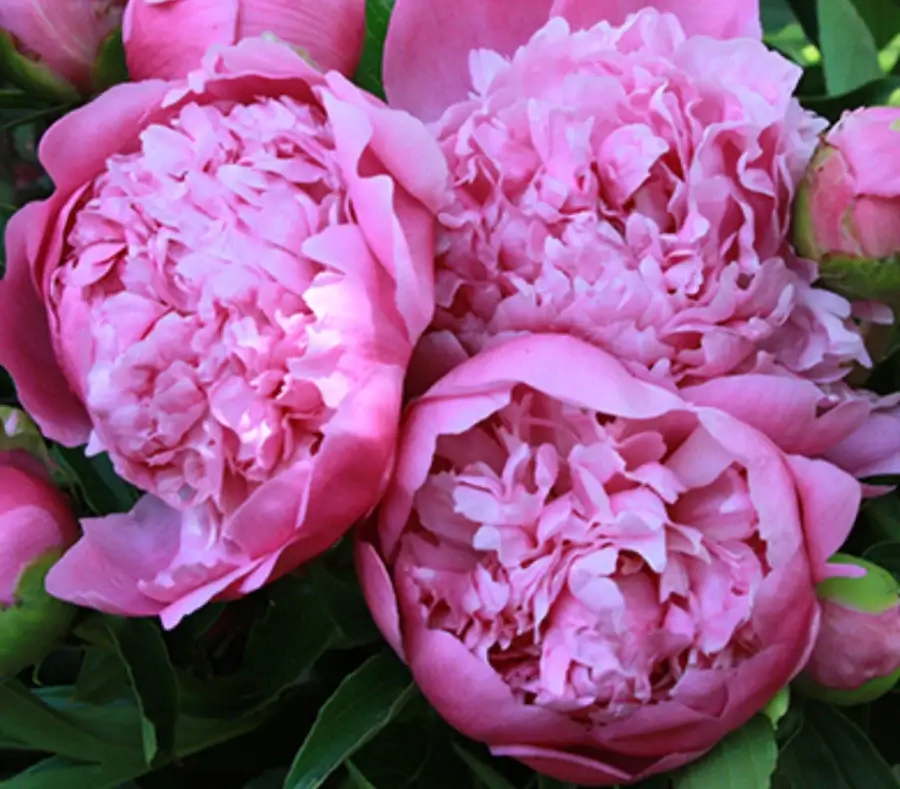
Tree Peonies
They are native to China, and are woody shrubs prized for their large, often fragrant flowers and ornamental foliage. Tree peonies have woody stems year-round, adding structure to the garden even when not in bloom. Tree peonies come in an array of colors and flower forms, ranging from delicate pastels to bold, saturated hues.

Here are the main types of tree peonies:
Single-flowered Tree Peonies
Single-flowered tree peonies feature blooms with a single row of petals surrounding a prominent center of stamens. These peonies often have large, striking flowers with a simple yet elegant appearance. Examples include ‘Rockii’, ‘High Noon’, and ‘Shima-Nishiki’.
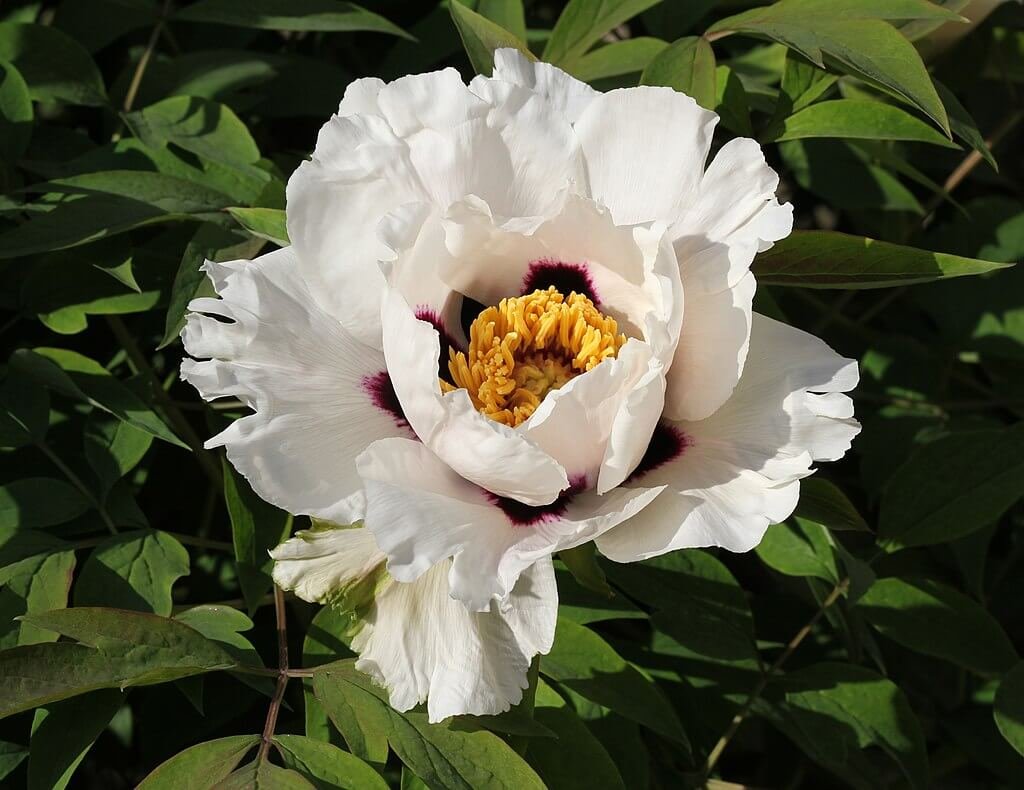
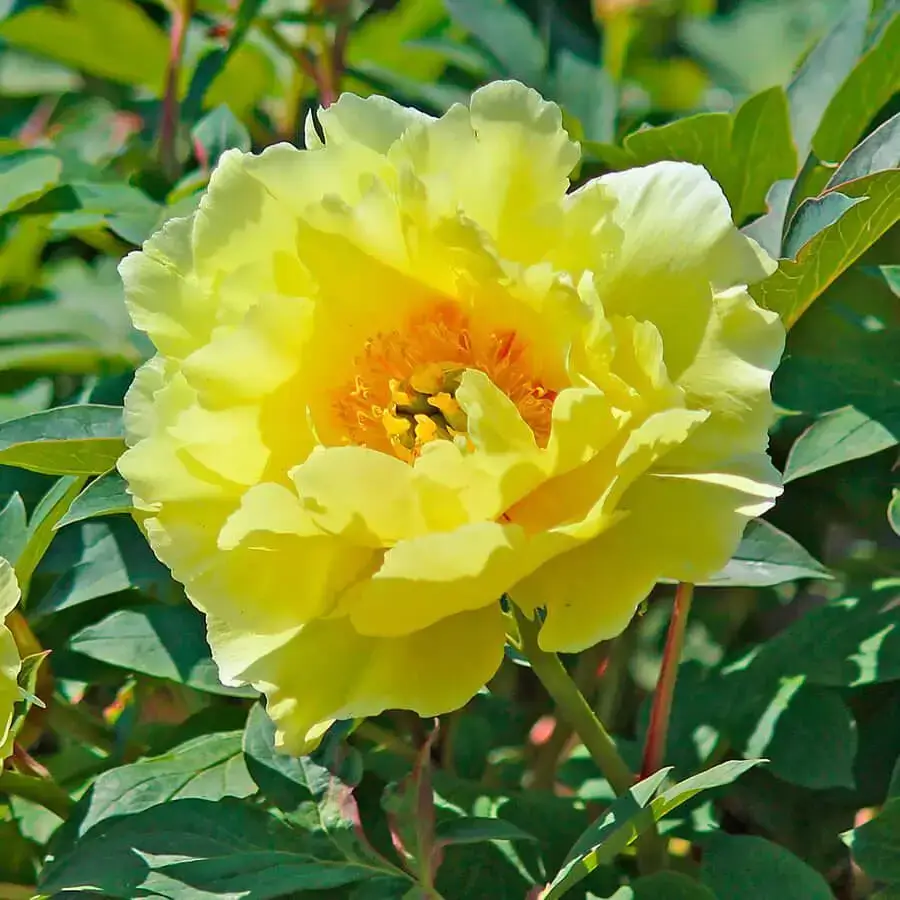
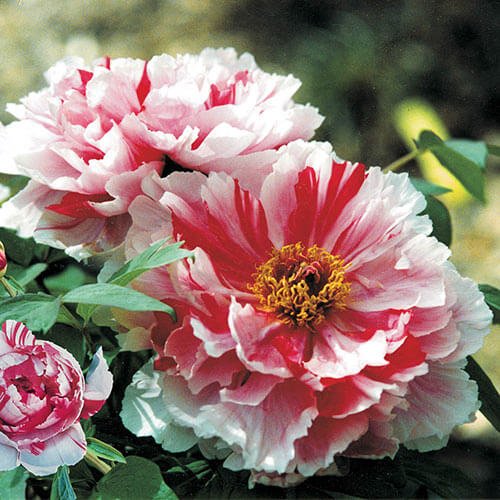
Double-flowered Tree Peonies
Double-flowered tree peonies are prized for their densely packed petals, creating a lush and opulent bloom. These peonies may have multiple layers of petals, giving them a lavish and voluminous appearance. Varieties such as ‘Renkaku’, ‘Kamada Nishiki’, and ‘Golden Era’ showcase the beauty of double-flowered tree peonies.
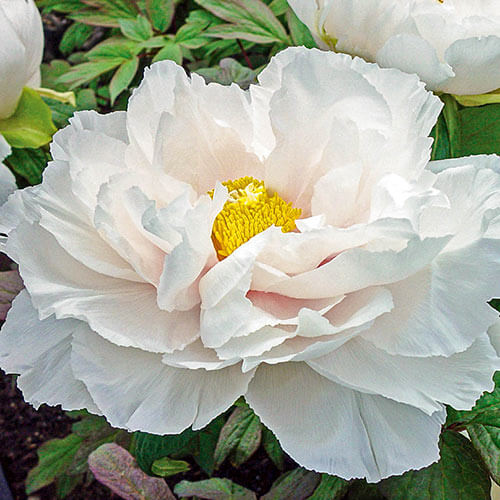
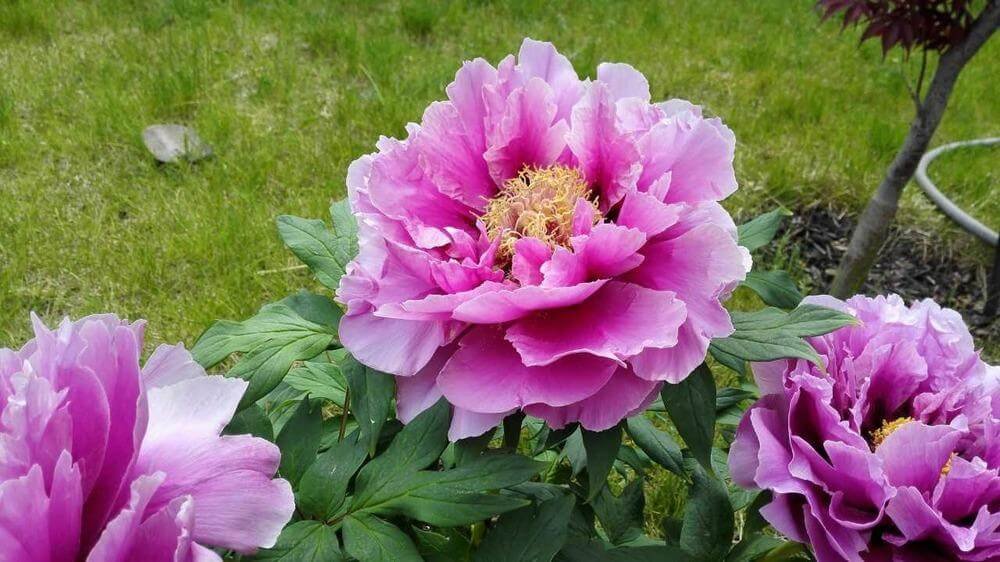
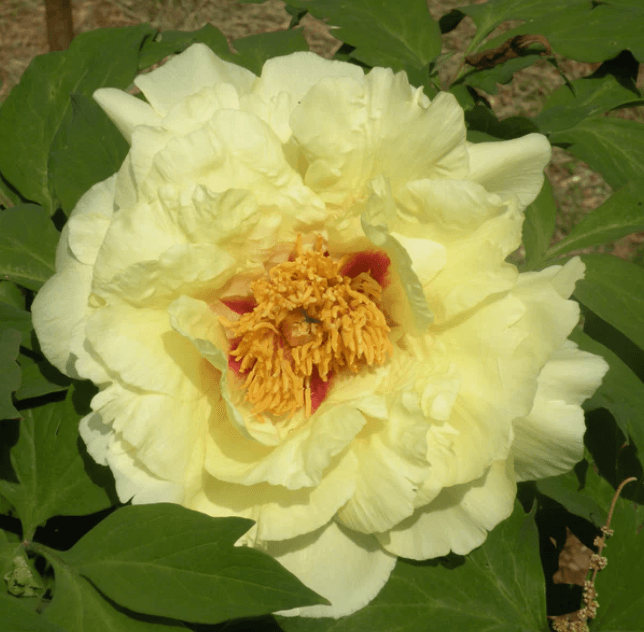
Semi-double-flowered Tree Peonies
Semi-double-flowered tree peonies feature a combination of petals and stamens, offering a more intricate bloom form than singles. These peonies strike a balance between the simplicity of single-flowered varieties and the lushness of doubles. Varieties like ‘Age of Gold’, ‘Blue Sapphire’, and ‘Destiny’ exemplify the charm of semi-double-flowered tree peonies.
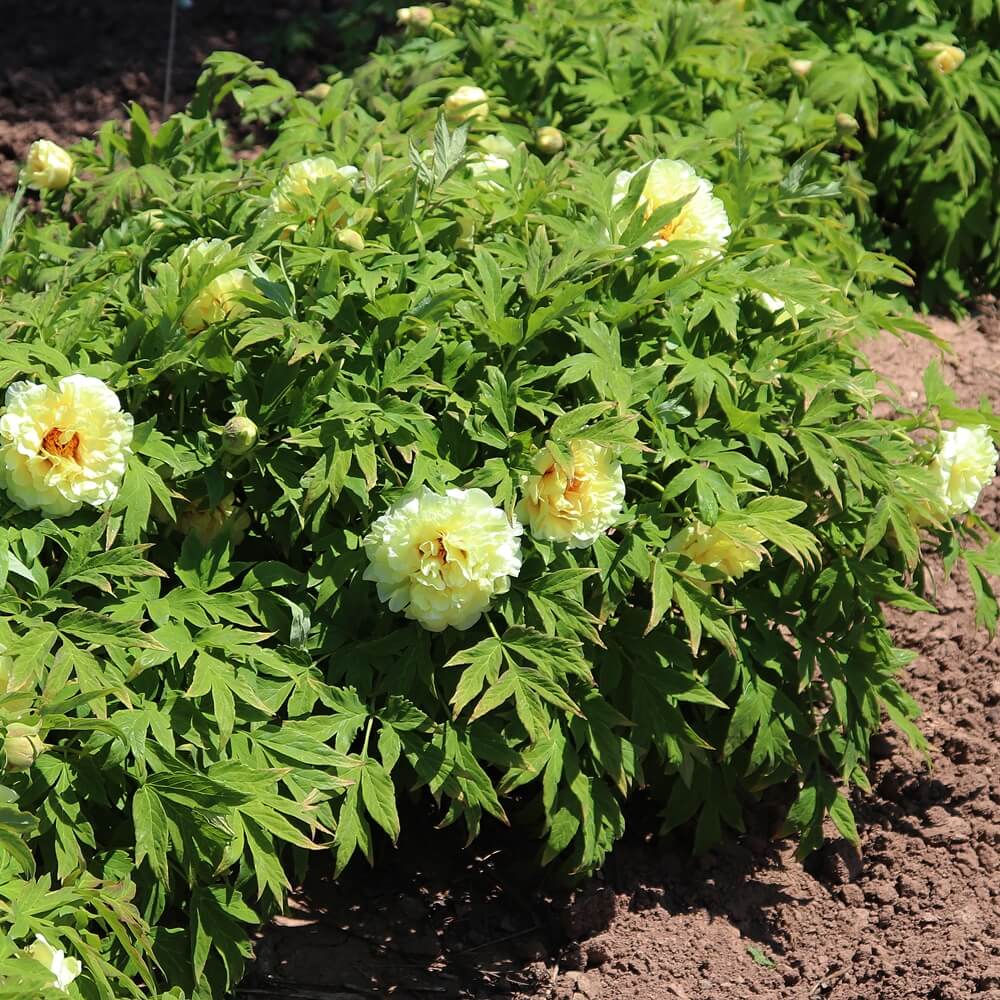
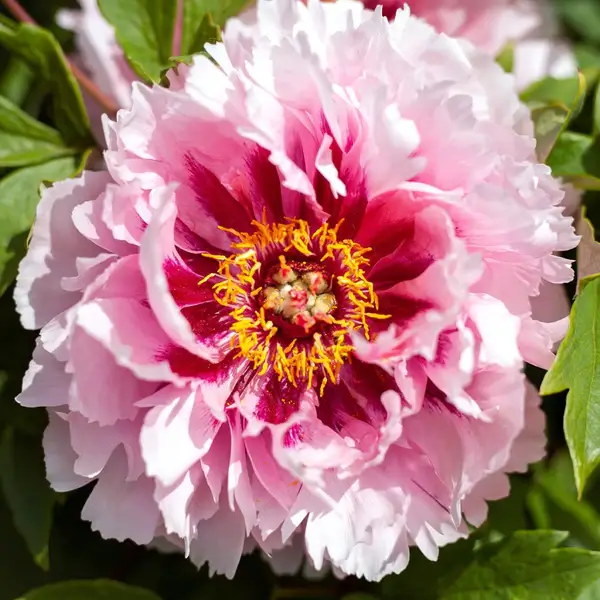
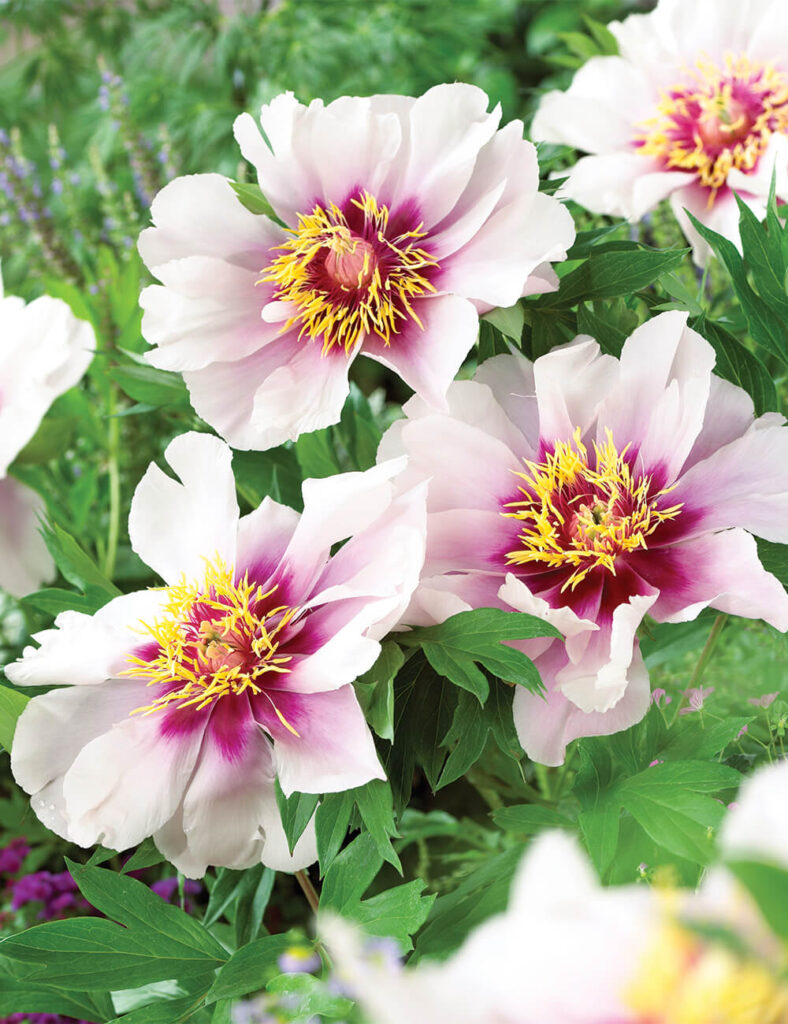
Japanese-flowered Tree Peonies
Japanese-flowered tree peonies feature a center of petaloid stamens surrounded by one or more rows of broad, flat petals. The central stamens may be of a contrasting color, creating a striking contrast with the surrounding petals. Varieties such as ‘Kinkaku’ showcase the beauty of Japanese-flowered tree peonies.

Hybrid Tree Peonies
Hybrid tree peonies are crosses between different species or varieties, resulting in a wide range of colors, forms, and characteristics. These peonies often exhibit unique traits and may incorporate traits from both parents. Examples include ‘Boreas’, ‘First Arrival’, and ‘Chiffon Clouds’.
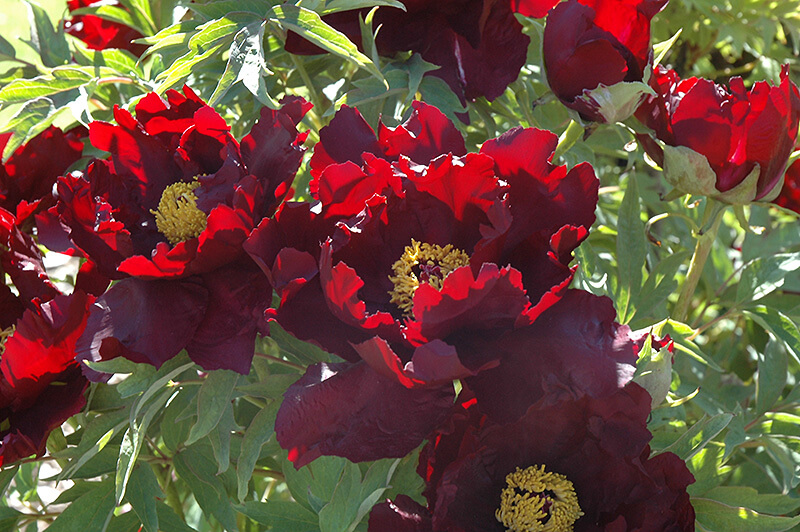
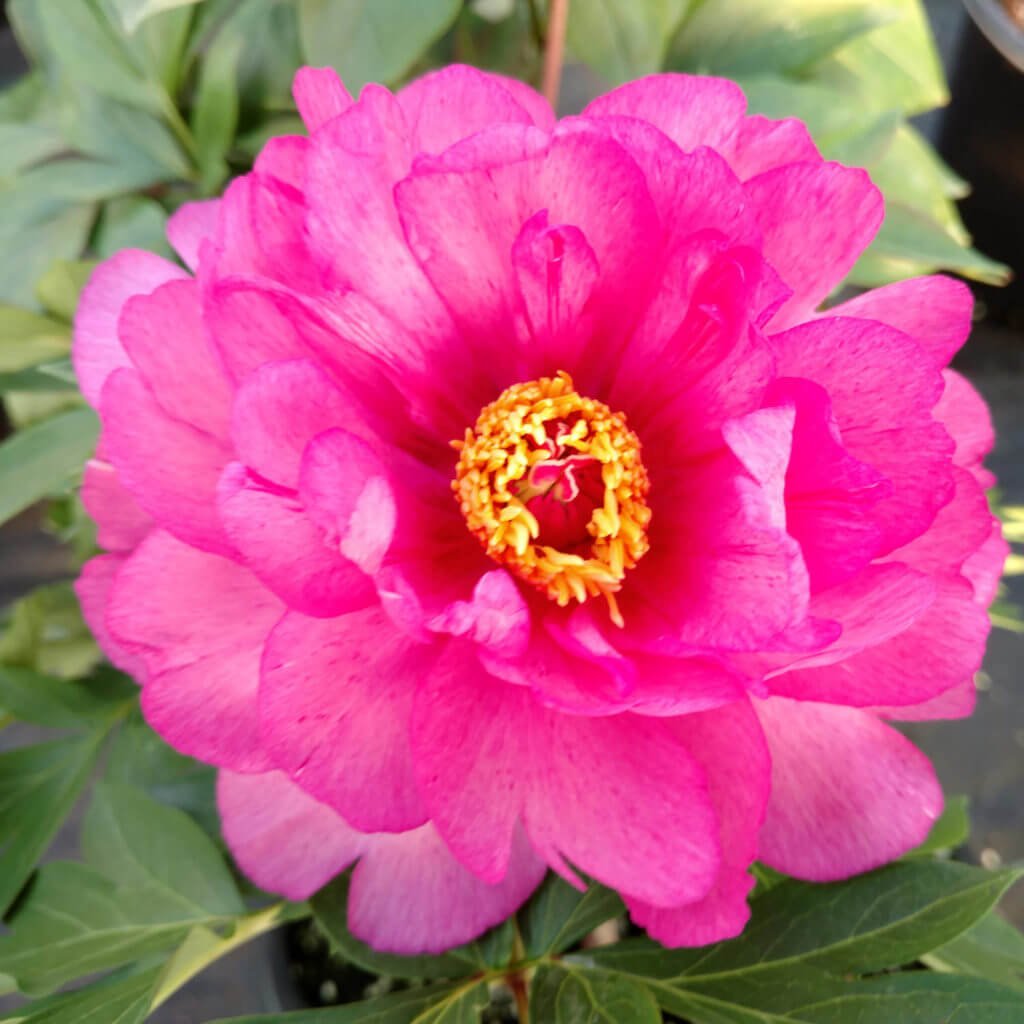
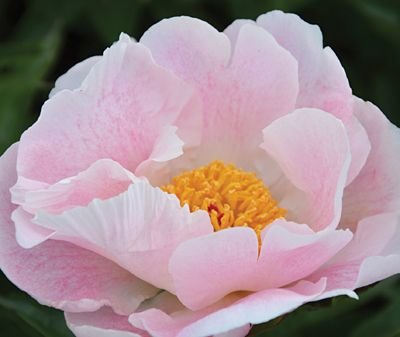
Intersectional (Itoh) Peonies
Intersectional peonies are hybrids between herbaceous and tree peonies, combining the best traits of both parents. These peonies feature sturdy stems, prolific blooming habits, and a wide range of colors and flower forms. Intersectional peonies are prized for their compact growth habit, long bloom period, and exceptional garden performance. Here are some common types of Intersectional peonies:

Single-flowered Intersectional Peonies
These varieties feature a single row of petals surrounding a central cluster of stamens. Single-flowered Intersectional peonies often have large, showy blooms with a simple yet elegant appearance. Examples include ‘Cora Louise’, ‘Julia Rose’, and ‘Border Charm’.



Double-flowered Intersectional Peonies
Double-flowered Intersectional peonies are prized for their densely packed petals, creating a lush and opulent bloom. These peonies may have multiple layers of petals, giving them a lavish and voluminous appearance. Varieties such as ‘Bartzella’, ‘Callie’s Memory’, and ‘Copper Kettle’ showcase the beauty of double-flowered Intersectional peonies.
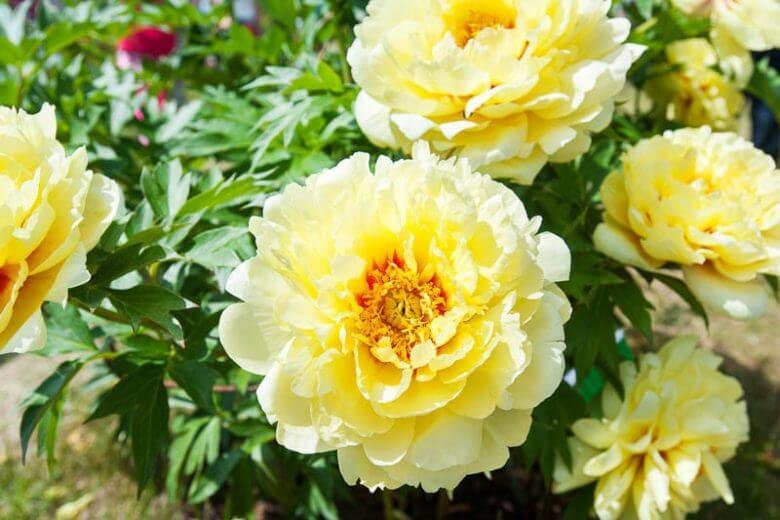
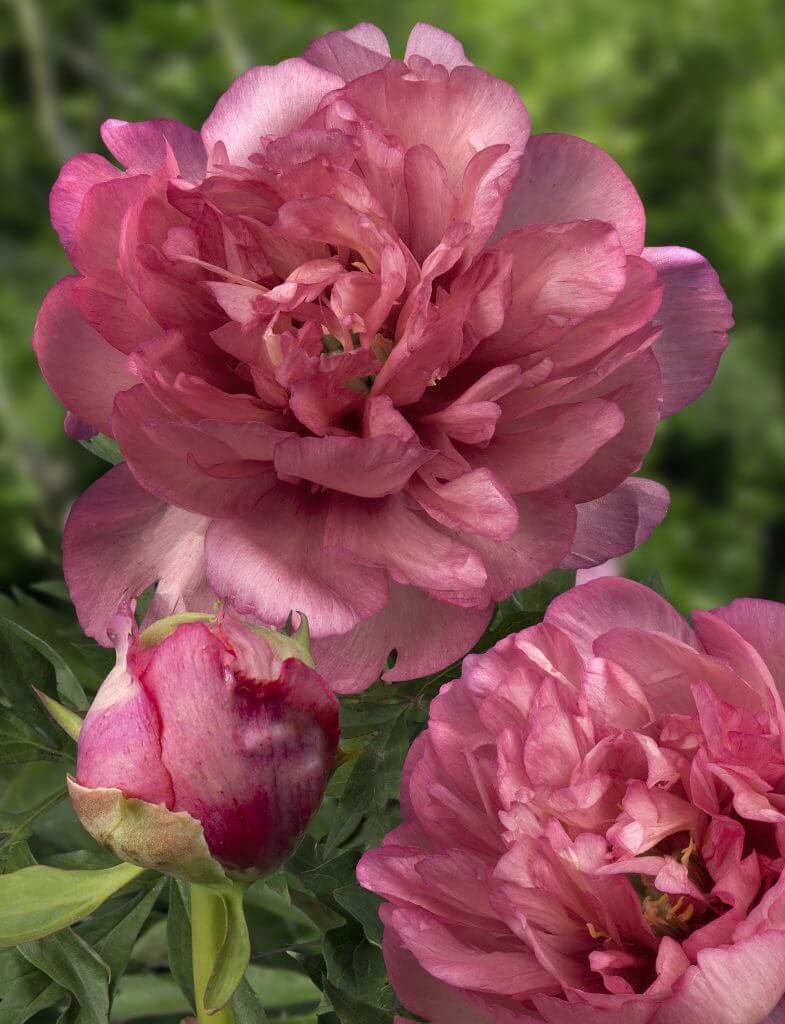
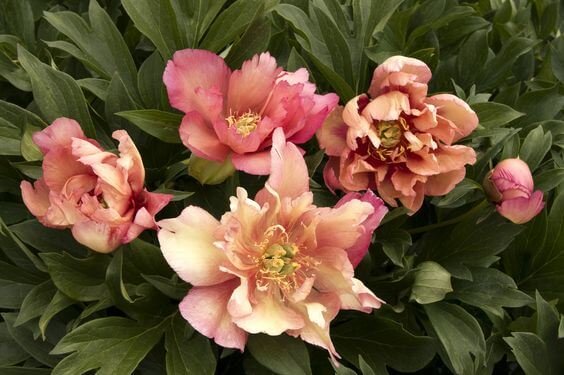
Semi-double-flowered Intersectional Peonies
Semi-double-flowered Intersectional peonies feature a combination of petals and stamens, offering a more intricate bloom form than singles. These peonies strike a balance between the simplicity of single-flowered varieties and the lushness of doubles. Varieties like ‘Canary Brilliants’, ‘Garden Treasure’, and ‘Hillary’ exemplify the charm of semi-double-flowered Intersectional peonies.
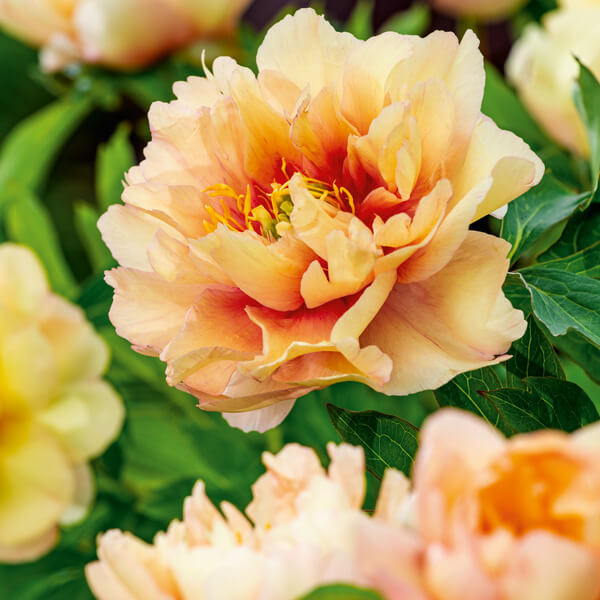
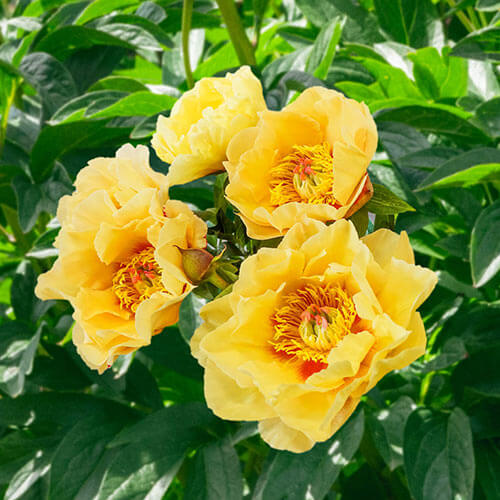
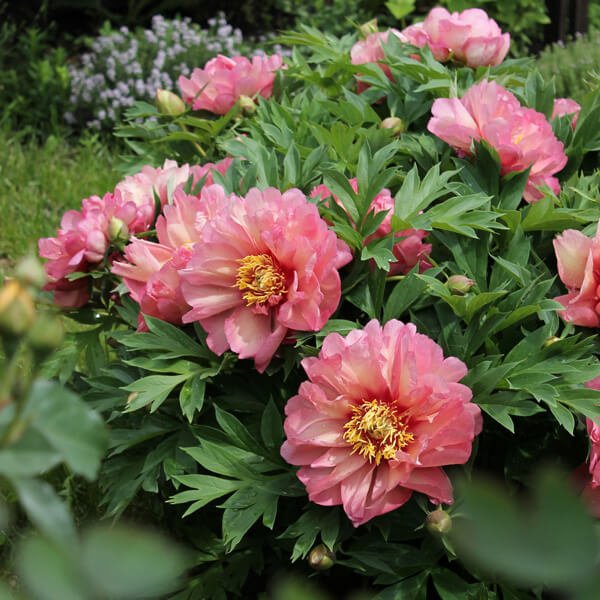
Japanese-flowered Intersectional Peonies
Japanese-flowered Intersectional peonies feature a center of petaloid stamens surrounded by one or more rows of broad, flat petals. The central stamens may be of a contrasting color, creating a striking contrast with the surrounding petals. Varieties such as ‘Sequestered Sunshine’ showcase the beauty of Japanese-flowered Intersectional peonies.

Unique Hybrid Intersectional Peonies
Intersectional peonies are hybrids with diverse colors, forms, and characteristics resulting from crosses between species or varieties. These peonies often exhibit unique traits and may incorporate traits from both parents. Examples include ‘Morning Lilac’, ‘Yellow Doodle Dandy’, and ‘Lemon Chiffon’.
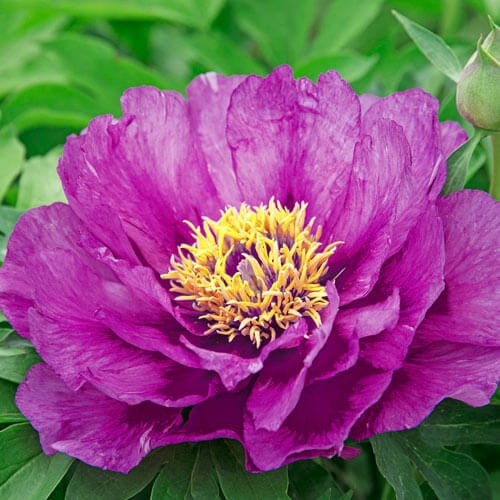
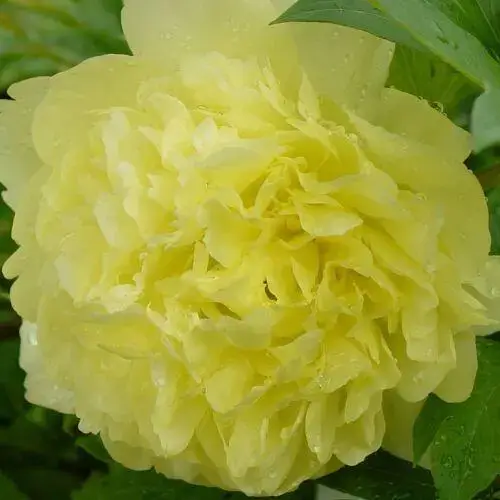
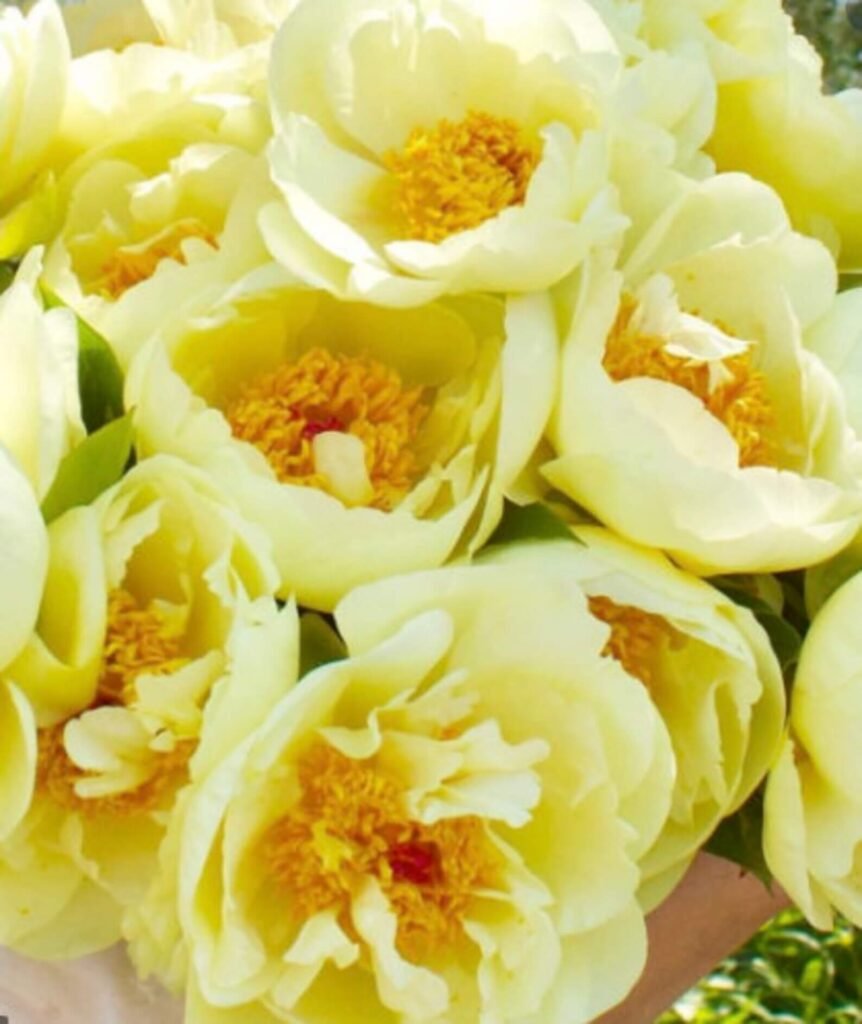
Creating the Ideal Growing Conditions
How to grow peonies requires planting them in well-draining soil with good sunlight exposure. They need well-draining soil with a pH of 6.5-7.5, 6 hours of sunlight daily, and balanced fertilizer in spring. Mulch with organic materials to retain moisture and regulate soil temperature.
Sunlight and Soil Requirements
For peonies, choose a well-drained, sunny area with loamy, slightly acidic soil enriched with organic matter. To check drainage, fill a hole with water and see if it drains within a few hours. Give peonies space away from competing trees or shrubs.
Optimizing Watering and Fertilization
Proper soil preparation is essential in learning how to grow peonies successfully. To ensure the optimal growth and blooming of your peonies, it’s essential to follow a few key care practices. Water deeply once a week during dry spells. Apply low-nitrogen fertilizer in early spring. Spread organic mulch around plants to retain moisture and suppress weeds. Use slow-release fertilizer for consistent nutrition. These practices will contribute to the overall health and vitality of your peonies, supporting their growth and abundant flowering.
Planting and Transplanting Techniques
When planting peonies, it’s essential to select a location with well-draining soil and abundant sunlight to support their healthy growth. Add organic matter to soil and dig wide holes for peony roots. When transplanting, excavate as much of the root ball as possible and reposition at the same depth.
Preparing the Soil for Planting
Before planting peonies, it’s crucial to ensure that the soil is well-prepared to provide an ideal environment for their growth. Loosen the soil to 12 inches using a fork or tiller. Add balanced fertilizer as per package instructions to enrich the soil with nutrients. Remove weeds and debris to prevent competition for resources and pest infestations. Test soil pH and adjust it to the optimal range of 6.5 to 7.0 for successful peony cultivation.
Transplanting Peonies with Care
When transplanting peonies, it’s crucial to prepare them adequately for the move. Begin by watering the peonies thoroughly a day or two before digging them up to ensure they are well-hydrated for the transplantation process. Using a sharp shovel or spade, carefully dig around the plant, creating a wide circle to minimize damage to the roots during transplantation. Once the peonies have been successfully transplanted, water them generously and apply a layer of mulch around the base to retain moisture and regulate soil temperature, aiding in their adjustment to the new environment. It’s important to refrain from fertilizing newly transplanted peonies immediately; instead, wait until they show new growth in their new location before applying any fertilizer to facilitate a smooth transition and encourage healthy development.
Caring for Peonies Throughout the Seasons
To keep your peonies thriving, regular watering is crucial, especially during hot and dry periods. This will maintain consistently moist soil without risking waterlogging, providing the ideal conditions for healthy growth. Applying a balanced fertilizer in early spring and after blooming will also support abundant flowering, ensuring your peonies reach their full potential. Additionally, mulching around your peonies in late fall can insulate them from extreme temperatures and retain moisture in the soil throughout winter. Don’t forget to deadhead your peonies by cutting off spent blooms right after flowering to redirect their energy into developing stronger roots, further promoting their overall health and vitality.
Pruning and Deadheading Tips
In early spring, it’s essential to prune away any dead or diseased foliage to discourage the spread of potential diseases and support the overall health of your peonies. Once planted, mastering how to grow peonies involves providing consistent care and attention. After the first fall frost, cutting back the peony stems to ground level and clearing away debris around the plants is crucial to minimize overwintering pests. Regularly deadheading faded flowers not only maintains a tidy appearance but also prevents seed production, redirecting the plant’s energy towards root and crown development. Additionally, removing spent foliage after the first frost plays a key role in eliminating overwintering diseases and pests, effectively preparing your peonies for a healthy upcoming growing season.
Winter Protection Strategies
It’s important to take protective measures to ensure that your peony plants remain insulated and well-protected during the winter months. By gently placing a layer of mulch over the base of the plants in late fall, you can shield them from extreme temperature fluctuations, providing essential insulation. Utilizing protective coverings such as burlap or frost cloth can safeguard your peonies from harsh winds and heavy snow accumulation, minimizing the risk of damage. Additionally, avoid walking on frozen or snow-covered soil around peony beds to prevent compaction that could potentially harm delicate root systems during their winter dormancy. Applying a layer of straw or evergreen boughs over the plants can offer additional insulation against freezing temperatures and frost heaving, further ensuring their well-being throughout the winter season.
Dealing with Pests and Diseases
When it comes to identifying common peony pests, keeping a close eye on the leaves and stems for any signs of discoloration or distortion is essential. Additionally, inspecting the undersides of the leaves and the surrounding soil for visible pests like spider mites, aphids, and nematodes can help in early detection. Implementing natural pest control methods, such as introducing beneficial insects like ladybugs or lacewings to combat harmful pests, can contribute to maintaining a healthy peony environment. Furthermore, applying a neem oil solution stands as a gentle yet effective approach to deterring and controlling various pests, safeguarding the well-being of your beloved peony plants.
Identifying Common Peony Pests
Peonies, while stunning and resilient, are susceptible to a range of pests and diseases. Spider mites, known for causing webbing on plants, and powdery mildew, characterized by a white powdery substance on leaves, are common issues to watch out for. Additionally, keep an eye out for aphids, small pests that tend to gather on new growth areas, and nematodes, which can lead to wilting or stunted growth in the soil. Furthermore, the presence of botrytis blight, indicated by brown spots on peony petals, often stems from excessive moisture or poor air circulation. Identifying and addressing these potential problems promptly is crucial to maintaining the health and vibrancy of your peonies.
Implementing Natural Pest Control Methods
Encouraging natural predators such as ladybugs, lacewings, and predatory mites is an effective method for controlling aphids and other small pests in your peony garden. Additionally, integrating aromatic plants like marigolds or chrysanthemums around your peonies can naturally deter certain pests due to their strong scents. If you’re dealing with soft-bodied insects like aphids, a simple yet effective solution involves spraying a mixture of water and mild dish soap, which helps reduce their populations without harming beneficial insects. Furthermore, utilizing diatomaceous earth around your peonies serves as a protective barrier against crawling pests while remaining harmless to both humans and pets. These natural pest control methods can contribute to maintaining a thriving and pest-resistant peony paradise in your garden.
Harvesting and Enjoying Your Peony Blooms
To ensure the best vase life for your peony blooms, it’s essential to harvest them at the right stage. When the buds are soft to the touch and displaying color, but not fully open, it’s the perfect time to cut them. After harvesting, trim the stems at a 45-degree angle and remove any foliage that will be below the waterline in your vase to prevent bacterial growth. When placing the freshly cut peonies in a vase, opt for lukewarm water with flower food to ensure proper hydration and full blooming over the next few days. To prolong the beauty of your peony blooms indoors, remember to keep them away from direct sunlight and sources of heat. This careful approach will help you learn how to grow peonies and fully enjoy these stunning plants.
Tips for Cutting and Arranging Peony Flowers
When cultivating peonies, it’s best to select flowers with buds displaying some color but still partially closed, as this leads to longer-lasting arrangements. To maintain the freshness of your peony arrangements, adding floral preservative to the vase water and changing it every other day is crucial. For an aesthetically pleasing arrangement, consider creating a focal point using larger, more open blooms surrounded by smaller buds and foliage. Additionally, cutting peonies in the early morning or late evening can help preserve their freshness due to cooler temperatures, ensuring your arrangements stand out beautifully.
Extending the Lifespan of Cut Peony Blooms
To extend the lifespan and beauty of your cut peonies, it’s essential to implement some simple yet effective care practices. Re-cutting the stems at an angle every few days not only encourages better water absorption but also contributes to prolonging the vibrancy of your peony blooms. Additionally, placing your peony arrangements away from ripening fruits is crucial, as the ethylene gas emitted can accelerate wilting. With proper care and attention, you can learn how to grow vibrant blooms from your peonies year after year. Moreover, keeping your peonies in a cool environment, free from drafts and excessive heat, can slow down the blooming process and extend their beauty. Lastly, misting your cut peonies with water daily provides them with the extra hydration they need, helping maintain their freshness for a longer period.
Conclusion
In conclusion, learning how to grow peonies successfully involves a comprehensive understanding of peony varieties, creating ideal growing conditions, mastering planting and transplanting techniques, and providing continuous care throughout the seasons. It’s essential to prioritize sunlight, soil, watering, and fertilization for optimal growth. Additionally, implementing effective pest control methods and strategies to combat diseases is crucial for maintaining a thriving peony paradise. Furthermore, harvesting and enjoying peony blooms require careful attention to detail, from selecting the right stage for harvesting to arranging them in a vase with proper care practices that extend their lifespan. By following these guidelines, you can cultivate a stunning and vibrant peony garden that brings endless joy and beauty to your outdoor space.
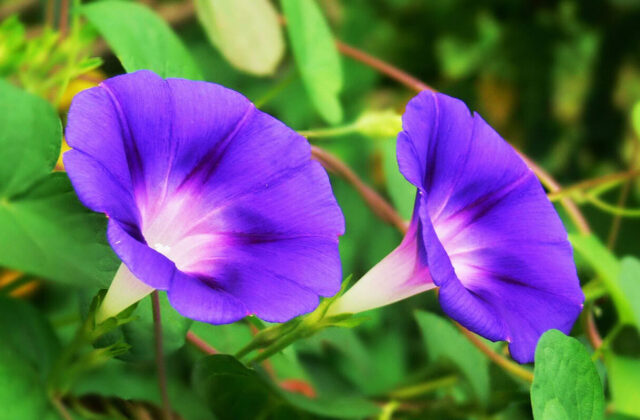
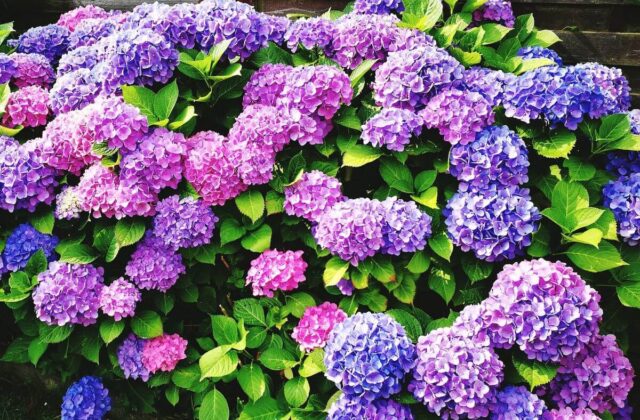
185 comments
Lots of people use their lotteries to raise money for useful initiatives that improve education, general public infrastructure and social services.
Once the lottery is performed by you, you’re helping to finance these programs when you fund your
own wishes of winning it big. Have fun and all the best!
Wow, awesome blog structure! How long have you been running a blog
for? you made running a blog glance easy. The whole look of
your website is wonderful, let alone the content! You can see similar:
najlepszy sklep and here najlepszy sklep
I just like the helpful information you provide for your articles.
I’ll bookmark your weblog and test again here frequently.
I am relatively certain I will be informed
plenty of new stuff proper right here! Best of luck for the next!
I saw similar here: sklep internetowy and
also here: sklep internetowy
Somebody essentially assist to make significantly posts
I would state. That is the very first time I frequented your web page and so far?
I surprised with the research you made to create this actual publish extraordinary.
Great job! I saw similar here: Dobry sklep
I’m excited to find this web site. I want to to thank you
for ones time for this particularly wonderful read!! I definitely liked every little bit of it and I have you book-marked
to check out new stuff on your blog. I saw similar here: Sklep
With havin so much written content do you ever run into any
problems of plagorism or copyright violation? My website has a lot of exclusive
content I’ve either authored myself or outsourced but it looks like a
lot of it is popping it up all over the internet without my permission.
Do you know any methods to help prevent content from
being stolen? I’d really appreciate it. I saw similar
here: Ecommerce
Good day! Do you know if they make any plugins to assist with SEO?
I’m trying to get my blog to rank for some targeted keywords but
I’m not seeing very good gains. If you know of any please share.
Cheers! You can read similar text here: Dobry sklep
Good day! Do you know if they make any plugins to help with SEO?
I’m trying to get my blog to rank for some targeted keywords but
I’m not seeing very good results. If you know of any please share.
Appreciate it! You can read similar text here: Sklep internetowy
Hey! Do you know if they make any plugins
to help with Search Engine Optimization? I’m trying to get my blog to rank
for some targeted keywords but I’m not seeing very good results.
If you know of any please share. Cheers! You can read similar art
here: Sklep internetowy
I’m now not positive the place you’re getting your info,
however great topic. I needs to spend a while learning much more or figuring out more.
Thank you for wonderful information I was on the lookout for this information for
my mission.
Feel free to visit my web-site :: vpn code 2024
Hello! Do you know if they make any plugins to assist with Search Engine Optimization? I’m
trying to get my website to rank for some targeted keywords
but I’m not seeing very good gains. If you know of any please share.
Many thanks! You can read similar blog here: Backlinks List
Hi! Do you know if they make any plugins to help with Search Engine Optimization? I’m trying
to get my website to rank for some targeted keywords
but I’m not seeing very good success. If you know of any please share.
Appreciate it! You can read similar article here: GSA Verified List
[url=https://oazithromycin.com/]zithromax coupon[/url]
[url=https://azithromycinmds.com/]buy azithromycin without a prescription[/url]
[url=http://bestmedsx.online/]reputable overseas online pharmacies[/url]
Wow, superb weblog format!
How long have you ever been blogging for? you made blogging glance easy.
The full look of your site is wonderful, let alone the content
material! I read similar here prev next and those was
wrote by Louann92.
Wow, superb blog format!
How lengthy have you been blogging for? you
make running a blog glance easy. The full glance of your web site is magnificent, as neatly as the content material!
You can read similar here prev next and those was wrote by
Dian84.
[url=http://metforminn.com/]metformin canada over the counter[/url]
Wow, amazing blog structure!
How lengthy have you ever been running a blog for?
you make running a blog look easy. The whole look of your web site is great, let alone the content material!
I read similar here prev next and that was wrote by Arleen04.
[url=http://drugstorepp.online/]canadian pharmacy sildenafil[/url]
[url=http://ezithromycin.online/]how much is zithromax 250 mg[/url]
[url=https://oazithromycin.online/]zithromax 600 mg tablets[/url]
[url=http://bestmedsx.online/]mexican pharmacy weight loss[/url]
batmanapollo.ru
[url=https://bestmedsx.online/]pharmacy order online[/url]
darkmarkets [url=https://mydarkmarket.com/ ]dark web market links [/url] deep web links
[url=https://oazithromycin.online/]cost of generic azithromycin[/url]
[url=http://drdoxycycline.online/]doxycycline cost australia[/url]
[url=https://ezithromycin.online/]azithromycin order online uk[/url]
[url=https://ciprocfx.com/]cipro 250 mg[/url]
online canadian pharmacy no prescription needed
pharmacy drugstore online
child porn
[url=http://baclofem.com/]where can i get baclofen[/url]
[url=http://azithromycinmds.com/]azithromycin over the counter price[/url]
порно
[url=https://diflucand.online/]generic diflucan 150 mg[/url]
[url=https://odiflucan.online/]diflucan 150 mg otc[/url]
us pharmacy no prior prescription
[url=https://baclofem.com/]baclofen over the counter canada[/url]
[url=https://ibaclofen.com/]baclofen tab 10mg[/url]
[url=http://doxycyclineo.com/]doxycycline 40 mg capsules[/url]
[url=http://tadalafilu.com/]cialis pills for sale uk[/url]
[url=http://flomaxms.online/]buy flomax uk[/url]
[url=https://okmodafinil.com/]buy modafinil online us[/url]
[url=https://albuterolo.com/]purchase ventolin inhaler online[/url]
canadianpharmacynoprescription.net
[url=https://modafinilmip.online/]how to buy modafinil australia[/url]
[url=http://lasixtbs.online/]buy furosemide 40 mg online uk[/url]
[url=https://modafinile.com/]how to buy modafinil online[/url]
[url=http://eflomax.com/]flomax for kidney stones in females[/url]
[url=https://ibaclofen.online/]baclofen 10mg tablets[/url]
[url=https://advaird.online/]advair 500 50[/url]
[url=http://mcadvair.online/]advair 500 mg[/url]
canadian pharmacy direct
[url=https://ibaclofen.com/]lioresal best price[/url]
[url=https://acyclovirmc.com/]acyclovir 800 mg price in india[/url]
[url=https://doxycyclineo.com/]doxycycline 7.5 mg[/url]
androgel canadian pharmacy
[url=https://doxycyclineo.online/]doxycycline 100mg tabs[/url]
[url=https://odiflucan.com/]diflucan 200 mg capsule[/url]
[url=https://mcadvair.online/]best advair prices[/url]
[url=http://baclofenx.com/]baclofen 25 mg[/url]
[url=http://vermox.company/]vermox tablet price in india[/url]
[url=http://adexamethasonep.online/]dexona 4mg[/url]
[url=http://diflucand.online/]diflucan 500 mg[/url]
[url=https://baclofem.com/]baclofen 10 mg buy online[/url]
[url=http://ifinasteride.com/]finasterid[/url]
[url=http://effexor.directory/]effexor 75 price[/url]
[url=https://effexor.directory/]effexor cost canada[/url]
[url=http://glucophage.online/]metformin cost in india[/url]
[url=https://eflomax.online/]flomax australia[/url]
[url=https://vermoxin.online/]online pharmacy vermox[/url]
[url=http://doxycyclineo.com/]doxycline[/url]
[url=http://aaccutane.com/]accutane mexico[/url]
[url=https://ciprocfx.com/]buy ciprofloxacin 500mg uk[/url]
[url=http://dexamethasonen.com/]dexamethasone 5[/url]
[url=http://diflucand.online/]buy diflucan over the counter[/url]
[url=https://xlyrica.online/]lyrica 50 mg tablets[/url]
[url=https://advaird.online/]advair 500[/url]
[url=https://strattera.company/]strattera online[/url]
[url=https://okmodafinil.com/]can you buy modafinil[/url]
[url=https://dezithromax.online/]buy zithromax pills[/url]
[url=https://lasixtbs.online/]lasix online pharmacy[/url]
[url=https://tretinoineff.online/]tretinoin gel prescription online[/url]
[url=http://mcadvair.online/]generic for advair diskus[/url]
[url=https://dexamethasonen.com/]dexamethasone 4[/url]
[url=http://dezithromax.online/]can you purchase zithromax[/url]
[url=http://bacclofen.online/]lioresal 5 mg[/url]
[url=http://toradol.directory/]toradol allergy[/url]
[url=http://bacclofen.online/]baclofen 159[/url]
[url=http://avermox.online/]vermox 100mg price[/url]
[url=https://eflomax.com/]how much is flomax[/url]
[url=http://xmodafinil.com/]provigil uk prescription[/url]
Very interesting topic, regards for putting up. “Nothing great was ever achieved without enthusiasm.” by George Ellis.
[url=https://ifinasteride.com/]finasteride 1mg coupon[/url]
[url=https://odiflucan.online/]candida diflucan[/url]
[url=https://tadalafilu.com/]tadalafil soft tabs cheap[/url]
[url=http://lasixtbs.com/]lasix canada no prescription[/url]
[url=https://lasixor.com/]order lasix without a prescription[/url]
[url=https://flomaxms.com/]flomax generic for sale[/url]
[url=https://declomid.online/]clomid medication in mexico[/url]
[url=https://doxycyclineo.online/]doxycycline canadian pharmacy[/url]
[url=http://flomaxms.com/]buy noroxin[/url]
[url=http://acyclovirlp.online/]cheap zovirax cream online[/url]
[url=https://avermox.online/]vermox plus[/url]
[url=https://modafinilmip.online/]modafinil 100 mg tablet[/url]
[url=https://acyclovirmc.com/]buy valacyclovir without a prescription[/url]
[url=https://ciproffl.online/]ciprofloxacin order online[/url]
[url=https://doxycyclineo.com/]buy cheap doxycycline uk[/url]
[url=https://lasixav.online/]can you buy furosemide over the counter[/url]
[url=https://accutaneo.com/]buy accutane 10mg online[/url]
[url=https://ciprocfx.com/]order ciprofloxacin online[/url]
[url=http://iclomid.com/]where to buy clomid australia[/url]
[url=https://doxycyclineo.online/]purchase doxycycline online uk[/url]
[url=http://nolvadexin.online/]buy nolvadex in india[/url]
[url=https://lasixtbs.online/]lasix tablets for sale[/url]
Wait a minute? Why is it only showing my views? :O
[url=http://diflucand.online/]diflucan buy[/url]
[url=https://doxycyclineo.online/]order doxycycline no prescription[/url]
[url=https://albuterolo.com/]can i buy albuterol[/url]
I like assembling useful information , this post has got me even more info!
[url=https://declomid.online/]clomid for sale in mexico[/url]
[url=http://eflomax.online/]flomax online prescription[/url]
[url=https://advaird.com/]advair cost in canada[/url]
[url=http://lasixav.online/]furosemide pills[/url]
[url=https://xmodafinil.com/]order modafinil[/url]
[url=https://tadacip.store/]tadacip 20 india[/url]
[url=https://mcadvair.online/]advair diskus 10 coupon[/url]
[url=http://xlyrica.com/]where to buy lyrica[/url]
[url=https://finasterideff.online/]best propecia[/url]
[url=https://glucophage.online/]where to get metformin in canada[/url]
[url=http://baclofem.com/]baclofen generic price in india[/url]
Can you be more specific about the content of your article? After reading it, I still have some doubts. Hope you can help me.
[url=https://avermox.online/]vermox buy[/url]
[url=https://accutaneiso.online/]accutane uk[/url]
[url=http://advaird.com/]advair diskus price comparison[/url]
Your article helped me a lot, is there any more related content? Thanks!
It’s actually a nice and helpful piece of information I am happy thatyou just shared this helpful information with usPlease stay us informed like this Thanks for sharing
lamerler olmez
ремонт телефонов москва
Профессиональный сервисный центр по ремонту сотовых телефонов, смартфонов и мобильных устройств.
Мы предлагаем: ремонт телефонов москва
Наши мастера оперативно устранят неисправности вашего устройства в сервисе или с выездом на дом!
my sister and I want to start a blog page together?
Не позволяйте финансовым трудностям застать вас врасплох. В нашем Telegram канале [url=https://t.me/s/novuy_zaim_sankt_peterbeug]Займы на карту без проверок[/url] вы найдёте решения, которые помогут получить деньги срочно и без отказа. Оформите заявку онлайн, и деньги будут переведены на вашу карту в кратчайшие сроки. Мы сотрудничаем с надёжными МФО, которые понимают ваши потребности и готовы предоставить займ без лишних вопросов. Доверьтесь профессионалам, и ваши финансовые задачи будут решены легко и быстро.
I’m looking for some really good business blogs to add to my google reader that are worthwhile following on an ongoing basis. Can you make and recommendations? I have Seth Godin’s already. Thanks!. . It would also be helpful if you told me why you liked these blogs..
I have a wordpress blog now, but I can’t figure out how to get readers into there! I have been using myspace and it’s been great, subscriptions like crazy, but a lot of them don’t have wordpress…so no leads there. Besides, I am posting the same info to both, so it’s not much of a point of them getting one. How can I increase my wordpress readership? I already utilize tags, but I still only got about 89 views in two weeks. . . . Thanks in advance–serious answers only, please!.
Профессиональный сервисный центр по ремонту бытовой техники с выездом на дом.
Мы предлагаем: ремонт крупногабаритной техники в москве
Наши мастера оперативно устранят неисправности вашего устройства в сервисе или с выездом на дом!
For applications in corrosive environments, Elite Pipe Factory offers titanium pipes that provide unmatched strength and resistance. These pipes are ideal for industries requiring superior performance under harsh conditions. Our dedication to quality makes Elite Pipe Factory a leading choice in Iraq for titanium pipes. Discover more about our products at elitepipeiraq.com.
Your point of view caught my eye and was very interesting. Thanks. I have a question for you. https://accounts.binance.com/ar/register?ref=V2H9AFPY
Your article helped me a lot, is there any more related content? Thanks!
Ищете мгновенные микрозаймы на карту от 1 до 30 тысяч рублей без отказа и проверок? [url=https://t.me/zaim_srochno_bez_otkaza_na_kartu/28]Микрозаймы 0% без звонков операторов[/url] предлагает список микрофинансовых организаций, готовых выдать деньги онлайн с 18 лет. Простое оформление, моментальное зачисление и никаких лишних вопросов. Подписывайтесь на канал, чтобы получить доступ к лучшим предложениям и решить свои финансовые задачи в кратчайшие сроки.
Your blog has really piqued my interest on this topic. Feel free to drop by my website https://shinylife.justclick.ru/track/0/anons/0/http://yw9.de/flyingstar/flughafentransfer-frankfurt-wiesbaden about Airport Transfer.
Your point of view caught my eye and was very interesting. Thanks. I have a question for you.
На этом сайте вы можете купить подписчиков и реакции для Telegram. Мы предлагаем качественные аккаунты, которые помогут росту вашего канала. Оперативная доставка и гарантированный результат обеспечат успешное продвижение. Цены выгодные, а оформление заказа занимает минимум времени. Запустите продвижение уже сегодня и нарастите активность в своем Telegram!
Накрутить подписчиков в Телеграмм бесплатно навсегда канал
访问者请注意,这是一个仅限成年人浏览的站点。
进入前请确认您已年满成年年龄,并同意了解本站内容性质。
本网站包含成人向资源,请理性访问。 色情网站。
若不符合年龄要求,请立即退出页面。
我们致力于提供健康安全的成人服务。
Happy to explore discussions, exchange ideas, and pick up new insights as I go.
I like learning from different perspectives and adding to the conversation when possible. Always open to different experiences and meeting like-minded people.
There is my website:https://automisto24.com.ua/
Searching for a person to handle a single hazardous job?
This platform specializes in connecting clients with workers who are willing to tackle serious jobs.
Whether you’re handling emergency repairs, hazardous cleanups, or complex installations, you’ve come to the right place.
All available professional is vetted and qualified to guarantee your safety.
hire an assassin
We offer clear pricing, detailed profiles, and safe payment methods.
No matter how difficult the situation, our network has the skills to get it done.
Begin your search today and find the ideal candidate for your needs.
Here necessary info about techniques for turning into a network invader.
Content is delivered in a transparent and lucid manner.
You’ll discover different tactics for accessing restricted areas.
Moreover, there are practical examples that reveal how to carry out these proficiencies.
how to become a hacker
Comprehensive info is often renewed to stay current with the recent advancements in cybersecurity.
Distinct concentration is centered around real-world use of the developed competencies.
Note that each activity should be employed legitimately and with good intentions only.
The platform you can find special promo codes for online betting.
The promo codes give access to obtain bonus advantages when participating on the service.
Available special codes are always up-to-date to assure their relevance.
By applying these offers you can improve your opportunities on the betting platform.
https://kocaktercume.com.tr/pages/zarabotaty_na_ghirah_chasty_3.html
Furthermore, complete guidelines on how to activate special offers are available for maximum efficiency.
Consider that specific offers may have expiration dates, so check them before employing.
Hello to our platform, where you can access exclusive materials created exclusively for grown-ups.
Our library available here is suitable only for individuals who are 18 years old or above.
Ensure that you are eligible before exploring further.
cum
Experience a special selection of age-restricted content, and dive in today!
This resource you can get access to unique promotional codes for the popular betting platform.
The compilation of enticing deals is constantly renewed to ensure that you always have reach to the newest opportunities.
Through these promotional deals, you can cut costs on your betting actions and improve your probability of achievement.
Every discount code are precisely tested for genuineness and performance before getting posted.
https://nikitajewels.com/art/obzor_igry_xcom_2_2016.html
Furthermore, we offer elaborate descriptions on how to activate each rewarding chance to improve your rewards.
Remember that some deals may have distinct clauses or limited availability, so it’s fundamental to study closely all the aspects before taking advantage of them.
This website provides various medical products for online purchase.
Users can quickly order essential medicines from your device.
Our catalog includes popular treatments and specialty items.
Everything is provided by licensed distributors.
fildena super active 100 mg
We maintain customer safety, with private checkout and fast shipping.
Whether you’re managing a chronic condition, you’ll find trusted options here.
Begin shopping today and enjoy stress-free online pharmacy service.
Our platform provides a large selection of medications for ordering online.
You can securely buy essential medicines from your device.
Our range includes everyday medications and specialty items.
Everything is acquired via reliable suppliers.
fildena 150mg tablets
We maintain discreet service, with private checkout and fast shipping.
Whether you’re treating a cold, you’ll find what you need here.
Visit the store today and get reliable healthcare delivery.
This online service makes available a large selection of medical products for ordering online.
Customers are able to conveniently order essential medicines from your device.
Our catalog includes standard drugs and more specific prescriptions.
Each item is acquired via licensed distributors.
vidalista 20 vs cialis
We prioritize user protection, with data protection and prompt delivery.
Whether you’re looking for daily supplements, you’ll find affordable choices here.
Visit the store today and get reliable access to medicine.
1XBet Promotional Code – Special Bonus as much as $130
Apply the One X Bet bonus code: 1XBRO200 when registering in the App to avail special perks offered by One X Bet and get welcome bonus maximum of 100%, for placing bets along with a casino bonus featuring 150 free spins. Launch the app then continue through the sign-up procedure.
This One X Bet bonus code: Code 1XBRO200 provides an amazing starter bonus to new players — full one hundred percent as much as 130 Euros upon registration. Bonus codes serve as the key for accessing rewards, also One X Bet’s bonus codes aren’t different. When applying this code, players can take advantage of several promotions in various phases within their betting activity. Though you aren’t entitled for the initial offer, One X Bet India guarantees its devoted players get compensated via ongoing deals. Look at the Deals tab on their website regularly to stay updated about current deals designed for current users.
1xbet promo code today
Which 1xBet promo code is presently available at this moment?
The promo code applicable to 1XBet equals 1xbro200, enabling first-time users registering with the betting service to unlock a reward of €130. In order to unlock special rewards for casino and bet placement, please input the promotional code concerning 1XBET during the sign-up process. To take advantage of this offer, potential customers should enter the promo code 1xbet during the registration step to receive a 100% bonus on their initial deposit.
1XBet Promotional Code – Exclusive Bonus as much as €130
Use the 1xBet promotional code: 1xbro200 during sign-up in the App to unlock the benefits given by 1xBet and get 130 Euros up to 100%, for wagering along with a 1950 Euros with one hundred fifty free spins. Start the app followed by proceeding by completing the registration steps.
The One X Bet bonus code: Code 1XBRO200 gives an amazing starter bonus to new players — a complete hundred percent up to 130 Euros during sign-up. Promo codes act as the key for accessing extra benefits, also 1XBet’s promotional codes are the same. When applying this code, bettors may benefit of various offers throughout their journey within their betting activity. Although you aren’t entitled for the welcome bonus, One X Bet India ensures its loyal users receive gifts via ongoing deals. Look at the Deals tab on their website regularly to stay updated about current deals designed for loyal customers.
https://linkmate.mn.co/members/33703361
What One X Bet promotional code is currently active right now?
The promotional code applicable to One X Bet equals Code 1XBRO200, which allows novice players registering with the bookmaker to access a reward worth $130. To access exclusive bonuses for casino and bet placement, please input this special code related to 1XBET during the sign-up process. To make use of this offer, potential customers need to type the promotional code Code 1xbet at the time of registering process for getting a 100% bonus on their initial deposit.
Здесь вы можете найти актуальные промокоды Melbet-промо.
Используйте их во время создания аккаунта на платформе чтобы получить до 100% на первый депозит.
Плюс ко всему, доступны промокоды в рамках действующих программ игроков со стажем.
мелбет промокод при регистрации бонус
Проверяйте регулярно на странице бонусов, не пропустив выгодные предложения для Мелбет.
Любой код тестируется на работоспособность, и обеспечивает безопасность в процессе применения.
1xBet Promotional Code – Special Bonus up to €130
Use the 1XBet promo code: 1XBRO200 when registering via the application to access exclusive rewards offered by One X Bet to receive welcome bonus maximum of 100%, for placing bets and a 1950 Euros featuring one hundred fifty free spins. Open the app followed by proceeding by completing the registration process.
The 1xBet bonus code: 1xbro200 offers a fantastic starter bonus for first-time users — a complete hundred percent as much as $130 upon registration. Promotional codes serve as the key for accessing rewards, and 1xBet’s bonus codes are the same. By using such a code, bettors can take advantage from multiple deals in various phases within their betting activity. Although you aren’t entitled to the starter reward, 1XBet India makes sure its regular customers are rewarded through regular bonuses. Visit the Offers page via their platform regularly to remain aware on the latest offers meant for loyal customers.
1xbet promo code for registration pakistan
Which 1xBet promotional code is now valid at this moment?
The promo code for 1xBet stands as 1XBRO200, enabling new customers signing up with the gambling provider to gain an offer of $130. To access unique offers for casino and wagering, make sure to type our bonus code related to 1XBET during the sign-up process. To make use of this offer, potential customers should enter the promotional code 1xbet at the time of registering step so they can obtain a full hundred percent extra on their initial deposit.
Within this platform, access interactive video sessions.
Whether you’re looking for engaging dialogues or professional networking, you’ll find options for any preference.
The video chat feature is designed for bringing users together globally.
Delivering crisp visuals plus excellent acoustics, any discussion is immersive.
You can join community hubs initiate one-on-one conversations, according to your preferences.
https://gaychat.moscow/
All you need a reliable network plus any compatible tool to get started.
Здесь представлены свежие бонусы Melbet-промо.
Воспользуйтесь ими зарегистрировавшись на сайте для получения полный бонус за первое пополнение.
Кроме того, здесь представлены бонусы по активным предложениям для лояльных участников.
промокод мелбет на сегодня при регистрации
Следите за обновлениями в рубрике акций, чтобы не упустить выгодные предложения от Melbet.
Все промокоды проверяется на валидность, что гарантирует надежность во время активации.
Here, explore a wide range virtual gambling platforms.
Whether you’re looking for classic games or modern slots, there’s something to suit all preferences.
All featured casinos are verified to ensure security, allowing users to gamble peace of mind.
1xbet
Additionally, this resource offers exclusive bonuses along with offers for new players and loyal customers.
Due to simple access, discovering a suitable site takes just moments, making it convenient.
Keep informed on recent updates with frequent visits, as fresh options are added regularly.
On this platform, you can access lots of online slots from leading developers.
Players can experience retro-style games as well as modern video slots with stunning graphics and exciting features.
Even if you’re new or a seasoned gamer, there’s something for everyone.
no depisit bonus
Each title are ready to play 24/7 and designed for PCs and mobile devices alike.
All games run in your browser, so you can jump into the action right away.
The interface is easy to use, making it quick to find your favorite slot.
Register now, and dive into the thrill of casino games!
Здесь доступны видеообщение в реальном времени.
Если вы ищете непринужденные разговоры переговоры, на платформе представлены варианты для всех.
Функция видеочата разработана чтобы объединить пользователей глобально.
секс чат пары
Благодаря HD-качеству и чистым звуком, каждый разговор становится увлекательным.
Подключиться в общий чат или начать личный диалог, в зависимости от того, что вам нужно.
Единственное условие — стабильное интернет-соединение плюс подходящий гаджет, и можно общаться.
Thanks for sharing. I read many of your blog posts, cool, your blog is very good.
Here, you can discover lots of online slots from top providers.
Users can enjoy classic slots as well as modern video slots with stunning graphics and interactive gameplay.
Even if you’re new or an experienced player, there’s always a slot to match your mood.
play aviator
The games are instantly accessible 24/7 and designed for PCs and mobile devices alike.
No download is required, so you can jump into the action right away.
Site navigation is intuitive, making it simple to explore new games.
Sign up today, and dive into the excitement of spinning reels!
Here, explore an extensive selection of online casinos.
Searching for traditional options new slot machines, there’s a choice to suit all preferences.
Every casino included fully reviewed to ensure security, enabling gamers to bet with confidence.
1xbet
What’s more, this resource offers exclusive bonuses and deals to welcome beginners and loyal customers.
Due to simple access, finding your favorite casino is quick and effortless, enhancing your experience.
Keep informed about the latest additions with frequent visits, since new casinos appear consistently.
Здесь вы можете найти видеообщение в реальном времени.
Вы хотите увлекательные диалоги переговоры, вы найдете варианты для всех.
Этот инструмент разработана чтобы объединить пользователей со всего мира.
бонгакамс зрелые
С высококачественным видео плюс отличному аудио, каждый разговор кажется естественным.
Войти в общий чат или начать личный диалог, исходя из того, что вам нужно.
Для начала работы нужно — стабильное интернет-соединение плюс подходящий гаджет, и вы сможете подключиться.
This website, you can find a great variety of online slots from top providers.
Users can experience classic slots as well as feature-packed games with vivid animation and exciting features.
Even if you’re new or a casino enthusiast, there’s a game that fits your style.
casino
All slot machines are ready to play anytime and designed for desktop computers and smartphones alike.
You don’t need to install anything, so you can start playing instantly.
Site navigation is easy to use, making it simple to browse the collection.
Register now, and discover the thrill of casino games!
The Aviator Game merges exploration with exciting rewards.
Jump into the cockpit and spin through cloudy adventures for massive payouts.
With its classic-inspired visuals, the game captures the spirit of pioneering pilots.
aviator game download
Watch as the plane takes off – withdraw before it disappears to lock in your rewards.
Featuring instant gameplay and immersive audio design, it’s a must-try for casual players.
Whether you’re chasing wins, Aviator delivers uninterrupted excitement with every round.
The Aviator Game merges exploration with exciting rewards.
Jump into the cockpit and try your luck through turbulent skies for huge multipliers.
With its classic-inspired graphics, the game evokes the spirit of pioneering pilots.
aviator game download
Watch as the plane takes off – cash out before it vanishes to grab your rewards.
Featuring seamless gameplay and dynamic audio design, it’s a top choice for gambling fans.
Whether you’re testing luck, Aviator delivers endless excitement with every round.
本站 提供 海量的 成人内容,满足 成年访客 的 需求。
无论您喜欢 什么样的 的 内容,这里都 种类齐全。
所有 材料 都经过 专业整理,确保 高品质 的 浏览感受。
色情照片
我们支持 多种设备 访问,包括 平板,随时随地 畅享内容。
加入我们,探索 无限精彩 的 两性空间。
Strategic Medicaid planning can help protect your retirement accounts. Our elder law attorneys near me can show you how.
Protecting retirement assets while qualifying for Medicaid requires specialized knowledge. Knowledgeable Medicaid planners provide strategic solutions.
Understanding how to protect assets during the Medicaid 5-year lookback is crucial. Ohio Medicaid planning attorneys offer strategic solutions.
regulatory expertise for medicaid requires specialized knowledge. Our legal team stays current with changing rules.